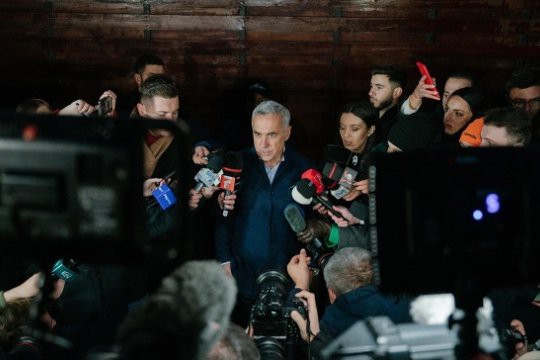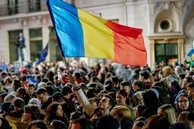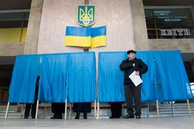The second round of the Romanian presidential elections, scheduled for Sunday, December 8th, was canceled the previous Friday by an unprecedented intervention of the Constitutional Court, orchestrated by local special services and their supervisors. Naturally, they were looking for a "Russian trace".
Western media outlets portray the colossal failure of Romania's political system, orchestrated by hand, with unclouded ease. "Georgescu, a pro-Russian, far-right troublemaker and NATO skeptic, came first with 22.9% of the vote and was supposed to face reformist Elena Lasconi (19.18%) in the second round, but now the elections will be held again," writes Politico [i]. This misrepresents the key points. The winner of the first round, independent candidate Calin Georgescu, who merely allowed himself to deviate from the pro-Ukrainian line for national-populist reasons, did not question Bucharest's NATO membership, while his pro-Moscow stance is overestimated by critics and competitors. Except for one aspect: the unexpected leader of the disrupted election race is indeed a "troublemaker" and an “upstart” for the political elite of the country, loyal to Washington and Brussels, and for special services controlled by their "senior partners"—the Information Service, the Foreign Intelligence Service, and the Special Communications Service—who compiled reports about the "activity of bots" on TikTok, allegedly orchestrated by Russia, agitating "weak minds" in favor of Georgescu, who managed to surpass the 10% threshold predicted by pro-government sociologists.
The trigger for the hasty annulment of the elections was the declassification of vague accusations by the outgoing Romanian president, Russophobe Klaus Iohannis, who served two five-year terms. The decision to annul the results of the first round of elections, held on November 24th, was made unanimously by the judges. However, this looks even more like a dirty game, since on December 2nd, the same Constitutional Court considered the same issue and did not question the results of the first round.
It is worth noting that the concerns of the special services also had a self-serving context: Romania is a presidential-parliamentary republic, where the head of state is not a ceremonial figure, as in Germany, but a person responsible for foreign policy and security policy; the president is the supreme commander of the Romanian armed forces and participates in the control of intelligence services.
Romania is an important hub in the logistics of NATO's hybrid war against Russia in Ukraine. According to the Kiel Institute for the World Economy, Bucharest has allocated €127 million in aid to Kyiv [ii]. Although most of it is humanitarian aid, Romania has also become one of the few NATO countries to agree to transfer Patriot air defense systems to Ukraine. The country also played a crucial role in transporting Ukrainian grain to foreign markets, mainly to Europe, through the Black Sea port of Constanta. The continued export of grain through Romanian territory to the detriment of local farmers was what Georgescu protested against.
Therefore, the violation of NATO and EU military discipline by Romanian voters had to be stopped without any sentiment. Significantly, even Georgescu's liberal rival Lasconi, who hoped to overtake him in the second round using familiar propaganda tools and attracting the votes of all his opponents, expressed undisguised displeasure. "This decision of the Constitutional Court is illegal and immoral. This is a moment when the Romanian state trampled on democracy. These elections should have continued to respect the will of the Romanian people," she said in a video message posted on social networks.
Lasconi's pathos about her "stolen victory" is apparently not shared by those who bet on the systemic candidate and favorite of preliminary calculations—the country's Prime Minister Marcel Ciolacu, who ultimately narrowly (by three hundredths of a percent) lost to the ultra-liberal, having taken third place and finding himself seemingly out of the game. Ciolacu, however, retaliated by hacking the election system, calling the unprecedented duplicity of the Constitutional Court "the only right decision" and assuring everybody that during the official investigation, all the circumstances of another "interference of Russia," which, according to him, led to a "clear distortion of the results" of the first round, will become known. The Prime Minister was seconded by Romania's General Prosecutor Alex Florența, who reported to Antena 3 CNN last Friday that two criminal cases concerning Calin Georgescu's election campaign had already been opened [iii].
Due to this "constitutional special operation" (or "color counter-revolution," if you please), the de facto expired President Iohannis, in tandem with Prime Minister Ciolacu, will steer the political processes in Bucharest until spring—the rerun of the first round of voting will possibly take place only in March 2025. Romania has sustained heavy reputational losses, Georgescu will strengthen his image as a hero-martyr (who will surely find a way to the next round of presidential elections), and the fears of the Western establishment of seeing a new Romanian leader in a trio with Euro-Atlantic dissidents Viktor Orbán and Robert Fico will subside. So "Western democracy" can rest easy; it is in the safe hands of the special services and Brussels.
The author's opinion may not coincide with the editorial stance.
[ii] https://www.ifw-kiel.de/topics/war-against-ukraine/ukraine-support-tracker/
[iii] https://www.antena3.ro/politica/alegeri-prezidentiale-2024/decizie-fara-precedent-curtea-constitutionala-a-anulat-alegerile-prezidentiale-surse-729835.html
read more in our Telegram-channel https://t.me/The_International_Affairs

 11:36 19.12.2024 •
11:36 19.12.2024 •



























